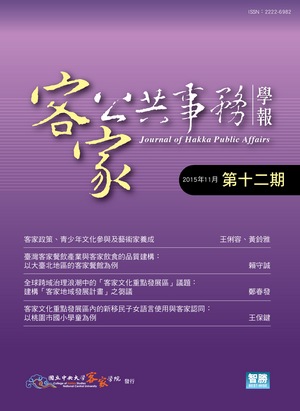Hot News
| 中文篇名 |
全球跨域治理浪潮中的「客家文化重點發展區」議題:建構「客家地域發展計畫」之芻議 | |
|---|---|---|
| 英文篇名 |
We Need “Hakka Region Plans”: Research on Development Issues of Hakka Region in the Global Wave of Cross-Boundary Governance | |
| 作者 | ||
| 中文摘要 |
2010年公布之《客家基本法》為客家族群保障與發展的重要圭臬。面對世界趨同的潮流,客家文化產業能否創造差異,趨異成為客家發展競爭力關鍵。另一方面,由歐洲共同體、北北基等跨區域整合的形成,到莫拉克風災引發河川治理、地方防救災的跨區議題,讓我們體悟到跨域治理已是全球必然趨勢。然而,在《客家基本法》現行體制下,傳統客家地域的發展卻面臨著客庄分處不同行政轄區,各自發展而無法形成客庄空間整體發展構想,例如,「桐花祭」為客庄帶來新的發展契機,這樣無心插柳的客家行銷,卻讓「桐花」與「客家」劃上相同的文化符號。客家文化正走向了一致性(趨同),同時間也抹煞了不少真正的在地客家文化,掩蓋了樸實客庄獨特的美麗。 | |
| 英文摘要 |
The movement of 1988 “recollecting my mother tongue” parade, opened the Hakka language awareness, prompting the government to rebuild a pluralistic liberal language policy. In 2010, the Hakka basic law bred in this context. Since then, the Hakka Basic Law is safeguard and development of the main pillar. However, when the world is convergence into a trend, could it make a difference, otherwise divergence has become competitive sources. On the other hand, from European Community has cross-regional integration to Morakot disaster, river governance, ecological conservation, and waste processing, these have made us understand the importance of cross-boundary governance. However, geographical of development of the original traditional Hakka is faced with the locations in different administrative areas, and cannot be formed as a Hakka village. Moreover, the opportunity of “Hakka Tung Blossom Festival” for local industries that has become the unintentional Hakka marketing and allowed the “flowers” and “Hakka” marked by the same cultural symbols. | |
| 關鍵詞 |
客家文化重點發展區、客家政策、特定區域計畫、國土計畫、Hakka culture development area、Hakka policy、Hakka region plan、Taiwan region plan | |
| 刊名 | ||
| 期數 | ||
| 起訖頁 |
045-068 | |
| 出版單位 | ||
| DOI | ||
| QRCode |
| |
| 上一篇 | ||
| 下一篇 |



